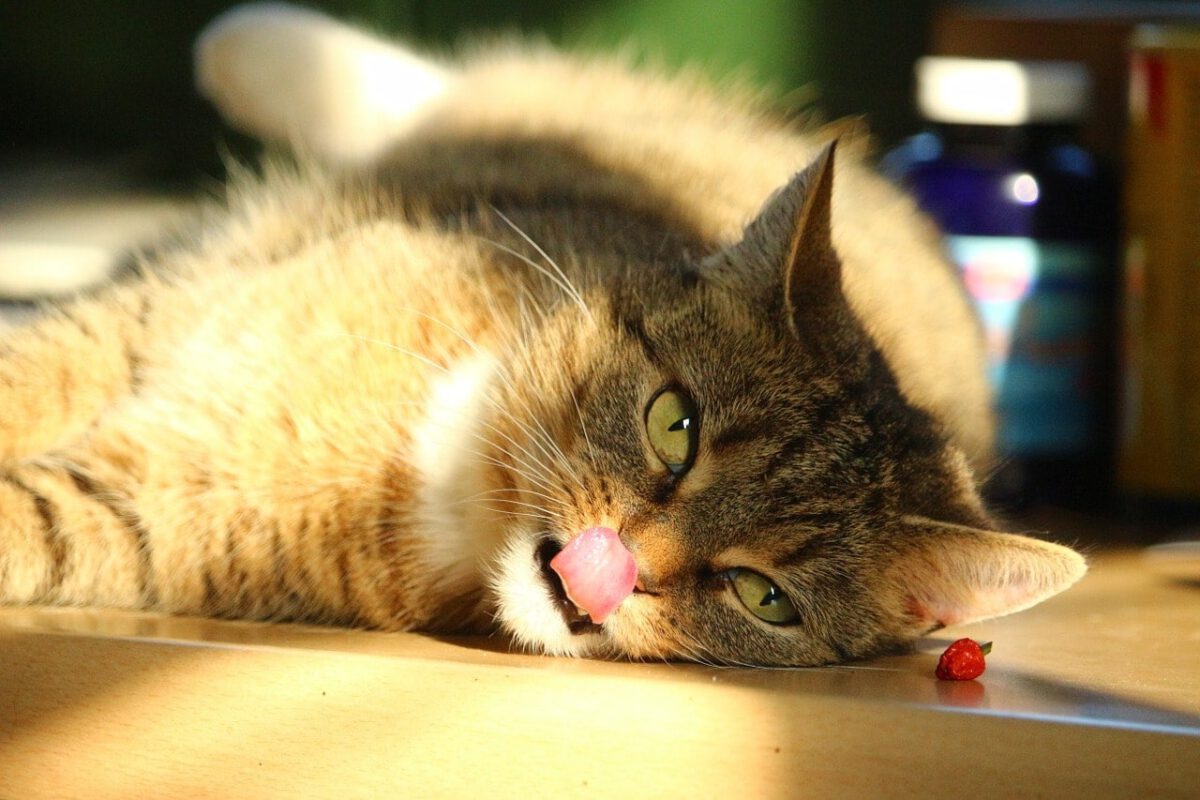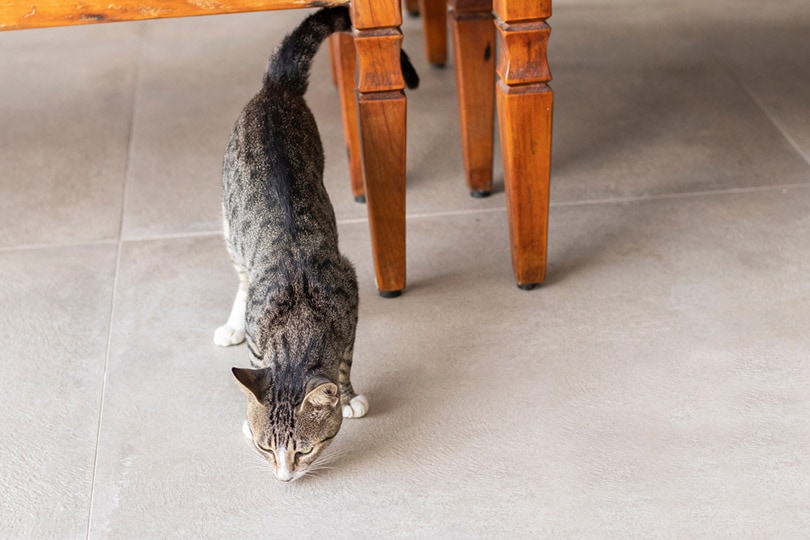As cat owners, we’ve all witnessed our furry friends engage in some peculiar behaviors. While most of these idiosyncrasies can be chalked up to feline quirkiness, there are some behaviors that may leave us perplexed and concerned. One such behavior is when cats start licking the floor. In this article, we’ll explore the reasons behind this behavior, differentiate between harmless and potential problem-causing factors, and provide tips on how to stop it.
The 5 Harmless Reasons Your Cat Licks the Floor
Cats may lick the floor for various reasons, many of which are harmless. Let’s explore some of these reasons:
1. They Just Like It
Sometimes, the simplest answer is the correct one. The texture of the floor may be enticing to your cat. Different types of flooring, such as plastic, wood, or concrete, provide unique sensory experiences that cats can find appealing. Whether it’s the smoothness of the wood or the rough texture of concrete, cats may lick the floor simply because they enjoy the sensation.
2. They Found a Different Water Source
Cats are notorious for seeking out alternative water sources, such as faucets or sinks. When condensation accumulates on floors, cats may be drawn to it as a novel hydration option. While this behavior is generally harmless, it’s crucial to ensure that your cat has access to clean, fresh water in their bowls. Monitor their water intake and consult with a veterinarian if you notice abnormal thirst.
3. They’re Anxious
Licking can be a self-soothing mechanism for cats. When cats groom themselves, they find comfort in the repetitive action. However, if they become anxious or stressed, they may transfer this behavior to other objects, including the floor. Identifying and addressing the source of your cat’s anxiety can help reduce their licking tendencies.
4. They Found a Spill
Cats have an exceptional sense of smell and can detect remnants of food or spills on the floor. If you’ve recently dropped food or spilled something, your cat may lick the floor to investigate or satisfy their hunger. Keep an eye on their behavior to determine whether they’re simply trying to clean up or signaling their hunger.
5. They Have Behavioral Issues
In some cases, cats may develop obsessive behaviors that manifest as excessive floor licking. While not necessarily dangerous, it’s advisable to consult with a veterinarian or cat behaviorist to discuss treatment options. Modifying your cat’s routine and potentially utilizing prescribed medication can help alleviate this behavior.
The 2 Serious Reasons Your Cat Licks the Floor
Although most cases of floor licking are harmless, there are a couple of serious reasons to be aware of. If you notice these behaviors or any other abnormal signs in your cat, it’s essential to seek veterinary assistance:
6. They Have Pica
Pica is a condition in which animals develop an urge to consume non-food items. Cats with pica may start by licking inedible objects, such as the floor, which can progress to ingesting objects that can cause digestive issues or blockages. If you suspect your cat has pica, consult with a veterinarian to identify the underlying cause and explore measures to stop the behavior.
7. They Smell Chemicals
Some cats may be attracted to the scent of chemical cleaners used on the floor. This can be dangerous, as licking chemical residues off the floor can be toxic to cats. Ensure that your cat is kept away from freshly cleaned surfaces until they have dried, and store all cleaning products safely out of their reach.
The 3 Things to Consider When Your Cat Licks the Floor
If your cat is engaging in floor licking behavior, there are a few factors to consider:
1. When Did It Start?
Take note of when your cat started licking the floor. If it has been a long-standing behavior, it may simply be a habit or preference. However, if the behavior is new, try to identify any recent changes in the environment or household dynamic that may have triggered it.
2. When Does It Occur?
The timing of the behavior can offer insights into its cause. If your cat licks the floor around mealtime, they may be indicating hunger. If they do it during loud noises, such as thunderstorms, it could indicate fear or anxiety. Understanding the context can help address the underlying issue.
3. Is the Floor Clean?
Regularly cleaning and vacuuming the floors can prevent your cat from ingesting dust, debris, or other objects that may be harmful to their health. Pay attention to potential hazards, such as scattered litter or objects that they may be tempted to lick.
How to Stop Your Cat From Licking the Floor
Once you have ruled out any underlying health issues, there are several strategies you can employ to discourage floor licking:
Increase Play: Boredom can lead to undesirable behaviors, such as floor licking. Engage your cat in interactive play sessions to provide mental and physical stimulation.
Redirect Their Attention: When you observe your cat licking the floor, divert their focus to more appropriate activities using treats, toys, or food. Encourage them to explore other areas by placing treats there and reward them with playtime when they ignore the floor.
Change Your Cleaner: If your cat is attracted to the scent of the floor cleaner, consider using an alternative product with a less enticing aroma, such as citrus-scented cleaners.
Provide Multiple Water Sources: If your cat is licking water off the floor, offer more water bowls in different areas of the house. Some cats prefer fountains with flowing water, which may encourage them to drink more.
Frequently Asked Questions
Q: How can I tell if my cat’s floor licking behavior is a sign of a serious problem?
A: If your cat’s floor licking is accompanied by other abnormal behaviors, noticeable changes in appetite or weight, or if they are consuming non-food items, it’s essential to consult with a veterinarian to rule out underlying health issues.
Q: Can excessive floor licking be harmful to my cat?
A: While harmless floor licking is generally not a cause for concern, excessive licking can lead to ingestion of harmful substances, blockages, or digestive issues. Monitoring your cat’s behavior and seeking veterinary guidance can help prevent potential harm.
Q: Is floor licking a common behavior in cats?
A: Floor licking is not uncommon in cats, and it can be attributed to a variety of harmless reasons. However, if the behavior is excessive or accompanied by abnormal signs, it’s best to consult with a veterinarian for further evaluation.
Conclusion
While cats may engage in floor licking for various reasons, most cases are harmless and can be managed with appropriate measures. By understanding the underlying causes and implementing the suggested tips, you can help redirect your cat’s behavior and ensure their safety and well-being. Remember, if you ever have concerns about your cat’s behavior, consulting with a veterinarian is always the best course of action.
Featured Image Credit: rihaij, Pixabay

